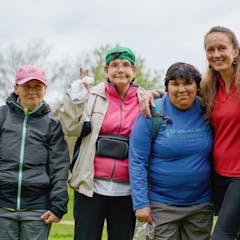
Articles on Civic engagement
Displaying 1 - 20 of 30 articles

Food forests are urban oases that pack a lot into small spaces, including food production, local cooling and social connections.

As the US gets less religious, some thinkers warn that it may get more selfish as people engage less with their communities. A team of scholars decided to investigate that concern.

People with intellectual disability told us they want better transport, employment and better maintained public toilets and pedestrian crossings. But many said their opinions were rarely sought.

A study of 3,000 companies found a correlation between local ‘social capital’ – which measures such variables as voter turnout and census response rates – and more women on corporate boards.

A quarter of Americans don’t know how they feel about the Build Back Better Act. Focusing on Americans’ individual stories – and not just political theater – could help fuel civic engagement.

The controversy over critical race theory is an opportunity for Americans to examine how other democracies deal with diverse viewpoints in public schools, an education policy expert argues.

While online communities may not fully address the isolation LGBTQ youth face in-person, they can serve as an important source of social support and a springboard for civic engagement.

Collecting, analyzing, aggregating and communicating data collected from businesses and industries can help consumers make purchasing decisions that align with their values.

Young voters are important to the continuity of democracy because voting at a young age leads to continued voting throughout life. This year more than most, they’ll have a hard time getting started.

A commission looking at the future of service is set to makesits recommendations. It is hoping to make a year of service ‘a norm’ for all Americans. What does it mean to serve?

How two massive opposing forces - the shift towards a sustainable world and the force that thrives on inequality - are unfolding at a global level.

Including direct accounts from ‘yellow vests’ members in the Lyon area, a look back at what has changed in the daily lives of people in the movement.

On the eighth anniversary of the Syrian uprising, scholar Wendy Pearlman writes about the people who risked their lives and raised their voices to fight the oppressive rule of Bashar al-Assad.

Before democracy South Africa’s mining sector prioritised profits over the people and environment. Not much has changed.

Journalism’s crisis – loss of readers, revenue and respect – has led many to conclude that if the news business is to survive, it has to do a better job of connecting with its audience. How can it be done?

New research into the economics of attention online casts doubt on the net’s role in fostering public debate, and raises concerns about the future of democracy.

John McCain did something during the 2008 U.S. presidential election that would seem very out of place today: he made himself vulnerable by speaking up about the character of opponent Barack Obama.

Increasingly, young people across Africa are taking up Nelson Mandela’s challenge of working to improve the lives of ordinary people.

Community proposals for public swimming pools are popping up all over the country. But individuals need to work with governments to ensure these projects actually get off the ground.

Social media sites aren’t the only online systems that can secretly influence people’s votes. Search engines can too and may be even more successful – and undetectable.
